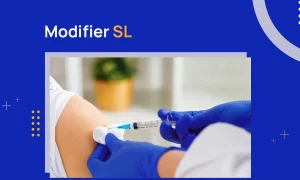From unforeseen complications to handling secondary steps of the primary surgery, there can be several reasons for an assistant surgeon to step into the operating room and help out with the surgery. But are the services of assistant surgeons justly recognized, and do they always get reimbursed for their services? Maybe not, but modifier 81 is here to change the game.
Let’s discuss in detail what modifier 81 is and how assistant surgeons can use it to collect up to 20% of the reimbursement rate.
Modifier 81 Description
Modifier 81 is a part of the set of modifiers used for ‘assistant at surgery’ services. Like modifiers 80, 82, and AS, modifier 81 describes that surgical assistant services were provided to the primary surgeon during surgery.
To understand the specifics of modifier 81, we must first explore who provides surgical assistance and why.
An assistant at surgery is a qualified surgeon or physician who helps the primary surgeon (surgeon in charge of performing the surgical procedure) to reduce complications and ensure a successful surgery. His work and involvement may vary in length and depth, ranging from minimal to extensive.
Modifier 81 is appended to the surgical procedure code when the assistant surgeon’s involvement is minimal and limited to a specific step in the surgery. Initially, the primary surgeon intends to perform the surgery alone, but due to growing complications, he requests assistance from another surgeon to ensure the procedure’s successful completion.
Note that Medicare accepts modifier 81 and reimburses the assistant surgeons at 16% of the allowed amount specified in the Physician Fee Schedule for that surgery.
What is Modifier 81 Used for?
Even the most seasoned surgeons and their billing staff get confused when reporting surgical assistant services. Because of this confusion, they end up applying the wrong modifier, which results in claim denials.
However, you can avoid this by comprehending the correct use of modifier 81 on your insurance claims. To help you, we have discussed some real-world clinical scenarios below where appending modifier 81 to the surgical procedural code makes perfect sense. Take a look!
Assistance to Reduce Internal Bleeding During Gastrointestinal Surgery
Assume that a patient with an infected appendix underwent appendectomy. Since the procedure was a minor surgery, a single general surgeon started the procedure and planned to complete it without assistance from another surgeon. However, during the procedure, he accidentally injured the surrounding blood vessels, which resulted in excessive bleeding.
Internal bleeding during gastrointestinal surgery is a major complication and affects the patient’s well-being. Therefore, he called an assistant surgeon to stop the hemorrhage. The assistant at the surgery identified the ruptured blood vessel and used ligation to stop the blood flow. The primary surgeon continued to remove the appendix. After the successful completion of the appendectomy, the assistant surgeon appended modifier 81 to the CPT code 44950 to bill for his part in the surgery.
You must also note that, according to the National Physician Fee Schedule Relative Value File Calendar Year 2025, the ‘assistant at surgery’ indicator value for CPT code 44950 is 2. It means that “payment restriction for assistants at surgery does not apply to this procedure,” and Medicare will pay the assistant surgeons when modifier 81 and sufficient documentation are appended to the claim.
Assistance with Suturing After An Abdominal Surgery
Imagine that an obese patient underwent an exploratory laparotomy to diagnose the cause of persistent abdominal pain and rectal bleeding. The procedure lasted 70 minutes, during which the surgeon inspected all the abdominal organs and tissues to detect the cause of pain and bleeding. The surgeon performed a surgery prior to this one and has another one lined up after this.
Due to his busy schedule, fatigue, and the extra effort required to suture an obese patient’s thick abdominal wall, he requested an assistant surgeon to take over suturing. The assistant surgeon stepped in and provided minimal support for suturing the patient’s abdomen after exploratory laparotomy. Hence, he will append modifier 81 to CPT code 49000 to collect reimbursement for his involvement in the surgery.
As above, the ‘assistant at surgery’ indicator value for CPT code 49000 is 2. So, Medicare will pay the assistant surgeons when modifier 81 is appended to the code.
Assistance with Temperature Control During a Complex Muscle Graft in the Leg
For our last example, consider a patient who experienced severe muscle damage in his leg due to blast trauma. To repair the damage, he underwent a muscle grafting treatment where a graft was created using healthy muscle tissue from his thigh. This graft was used to reconstruct his damaged leg muscles. The skilled primary surgeon harvested the graft and was able to connect it to the blood vessels and nerves in the leg (microsurgical anastomosis).
However, temperature control was needed to maintain the viability of the muscle graft. Hence, an assistant surgeon was called in to keep the graft moist with a saline solution and protect its delicate neurovascular pedicle, the stalk containing the blood vessels and nerves.
After the muscle grafting surgery, the primary surgeon used CPT code 15738 for full reimbursement, while the assistant surgeon appended modifier 81 to CPT code 15738 to collect his share of the payment. Since the indicator value for CPT code 15738 is also 2, Medicare will most likely reimburse the assistant surgeon at 16% of the allowed amount.
Accurate Usage Guidelines for Modifier 81
In the past, insurance payers have denied ‘assistance at surgery’ claims even when modifier 81 was appended because billers failed to follow the billing best practices and reimbursement guidelines. So, let’s discuss some key tips for the accurate usage of modifier 81 and ensure that your claims are accepted on the first try.
Understand the Specifics of Modifier 81
Modifier 81 can only be appended when the following conditions are met:
- The primary surgeon must have planned to perform the surgery alone.
- The assistant surgeon must be a qualified physician.
- The assistant surgeon must be called in for a short duration.
- The assistant surgeon’s involvement must be minimal during the surgery.
Refer to the Medicare Status Indicators
You can only append modifier 81 to the surgical CPT code to collect 16% of the agreed-upon reimbursement rate when the Medicare Status Indicator for that code is 0 or 2. Modifier 81 must not be appended when the ‘assistant at surgery’ indicator value for that CPT code is 1 or 9 because:
- Indicator 0: Payment restriction applies to this procedural code unless supporting documentation proves the medical necessity of an assistant surgeon during the surgery.
- Indicator 1: Statutory payment restriction applies to this procedural code. Medicare will not reimburse the assistant surgeon.
- Indicator 2: Payment restriction does not apply to this procedural code. Medicare will reimburse the assistant surgeon.
- Indicator 9: Concept does not apply.
Do Not Append to Non-Surgical CPT Codes
Please note that modifier 81 can only be appended to the surgical CPT codes because it is specific to the services of an assistant surgeon during surgery.
Should Not Be Reported By Non-Physician Assistants
You must understand who qualifies as an assistant at surgery and is therefore eligible to use modifier 81 and who does not. The following healthcare providers are eligible to use modifier 81 for reimbursement:
- Certified First Assistant (CFA)
- Certified Surgical First Assistant (CSFA)
- Certified Surgical Assistant (CSA)
However, the following providers are considered non-physician assistants and must append the AS modifier instead of modifier 81 for their assistant at surgery services:
- Medical Doctor (MD)
- Doctor of Osteopathic Medicine (DO)
- Physician’s Assistant (PA)
- Nurse Practitioner (NP)
- Registered Nurse First Assistant
Provide Accurate and Complete Documentation
You must also submit supporting documents with your claim form to prove the medical necessity of calling in an assistant surgeon during the surgery. For example, you must document the complications that occurred and the role the assistant surgeon played in overcoming them.
Refer to the Payers’ Specific Guidelines
Last but not least, you should take into account the specific rules that the payer has set for appending modifier 81 and policies regarding its reimbursement. For example, Medicare and Medicaid reimburse claims with modifier 81 at 16% of the physician’s fee for that surgery. However, commercial payers can pay up to 20%.
Modifier 80 vs 81
A slight difference in the wording of two modifiers’ descriptions can lead to immense confusion. So, was your ‘assistant at surgery’ claim ever denied because you used modifier 80 instead of 81? If yes, let’s understand the distinguishing features between modifiers 80 and 81 to save you from coding confusion and resulting claim denials.
| Modifier 80 | Modifier 81 | |
|---|---|---|
| Description | Assistant surgeon | Minimum assistant surgeon |
| Healthcare Professional | An assistant surgeon who is a physician. | An assistant surgeon who is a physician. |
| Involvement Level | Actively involved in the entire surgery. | Partially involved in some parts of the surgery. |
| Applicable Scenario | When an assistant surgeon assists the primary surgeon throughout the surgery or a substantial portion of it. The assistance is planned. | When an assistant surgeon steps in for a relatively short time to help out with a specific part of the surgery. The assistance is unplanned and provided due to mounting complications. |
| Medicare Reimbursement | 16% of the provider’s allowed fee for the surgery. | 16% of the provider’s allowed fee for the surgery. |
| Commercial Payer Reimbursement | E.g., LifeWise reimburses claims with modifier 80 at 20% to 16% of the allowed fee. | E.g., LifeWise reimburses claims with modifier 81 at 10% of the allowed fee. |
Final Thoughts
In today’s detailed guide on modifier 81, we explained that this modifier is appended to a surgical CPT code when an assistant surgeon, who is a qualified physician, steps in for a short time to take over a specific part of the surgery. Hence, his involvement during surgery is minimal.
Some clinical scenarios that would necessitate the use of modifier 81 are stopping internal bleeding during an appendectomy, suturing the incision after an exploratory laparotomy, and maintaining graft viability during muscle grafting in the leg. Next, we discussed some billing tips that would ensure first-pass acceptance of a modifier 81 claim, such as only using it with CPT codes that have an ‘assistant at surgery’ indicator value of 0 or 2 and submitting accurate and detailed documentation with the claim.
Last, we looked at the key differences between modifiers 80 and 81 to dispel some of the confusion. However, if you still struggle to append the correct modifier for your surgical assistance, consider outsourcing medical billing and coding services to experts at NeuraBill.



